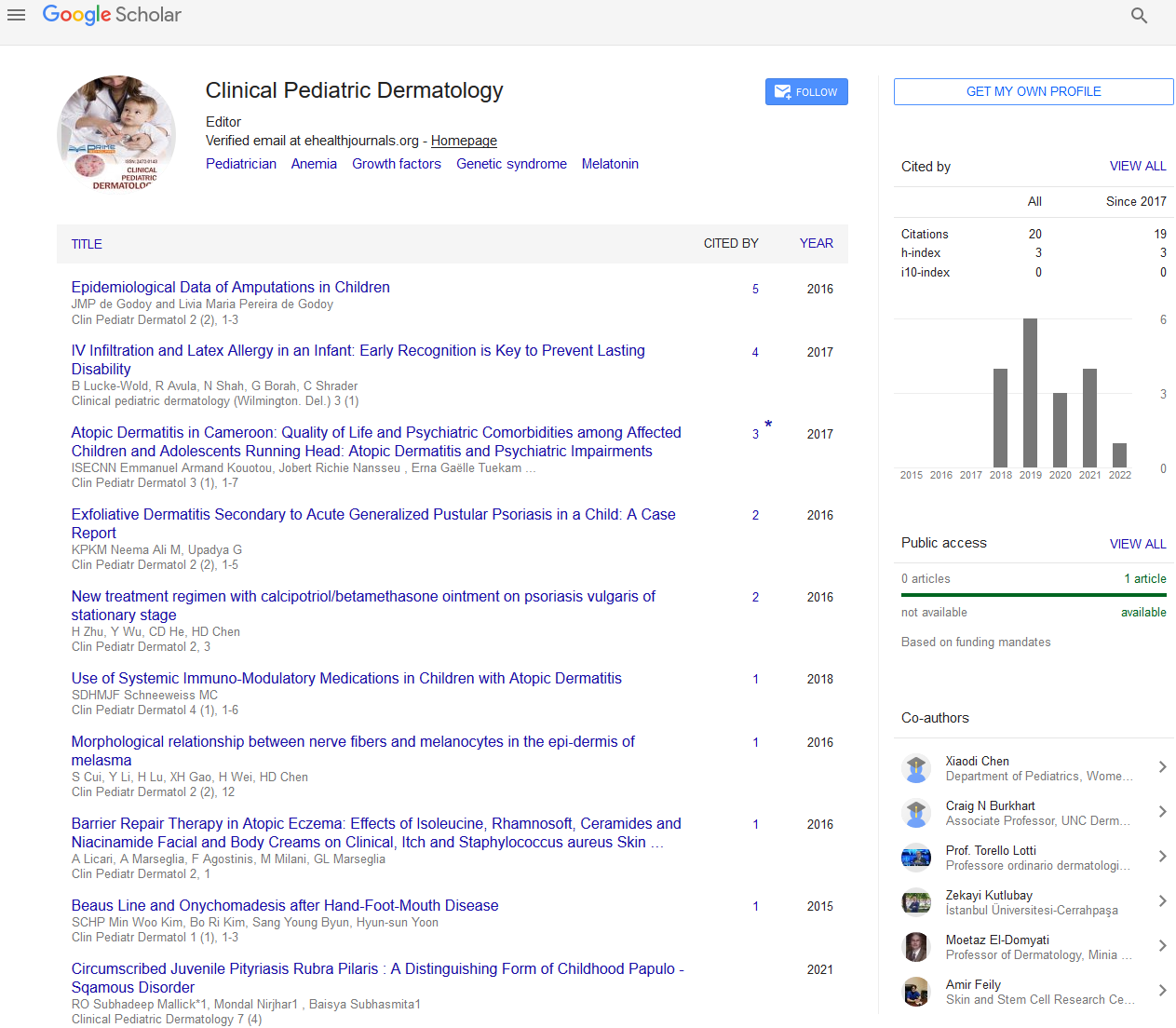Opinion - (2024) Volume 10, Issue 3
Addressing Psoriasis: From Immuno-pathogenesis to Holistic Patient Management
Jia Wu*
Department of Dermatology, Fudan University, China
*Correspondence:
Jia Wu,
Department of Dermatology, Fudan University,
China,
Email:
Received: 02-Sep-2024, Manuscript No. ipcpdr-24-21330 ;
Editor assigned: 04-Sep-2024, Pre QC No. ipcpdr-24-21330 (PQ);
Reviewed: 18-Sep-2024, QC No. ipcpdr-24-21330 ;
Revised: 23-Sep-2024, Manuscript No. ipcpdr-24-21330 (R);
Published:
30-Sep-2024, DOI: 10.36648/2472-0143.10.3.23
Introduction
Psoriasis is a chronic, immune-mediated skin disorder that
affects the global population. Characterized by erythematous
plaques with silver scales, it is a condition that extends beyond
the skin, impacting the quality of life, mental health, and overall
well-being of those affected. Psoriasis is not merely a cosmetic
issue; it is a complex, multifactorial disease with significant
comorbidities, including psoriatic arthritis, cardiovascular disease,
and metabolic syndrome. Despite advancements in understanding
its pathogenesis and treatment, psoriasis remains a challenging
condition to manage, with many patients experiencing inadequate
control of their symptoms. Psoriasis affects individuals of all
ages, but it is most commonly diagnosed in early adulthood. The
prevalence varies by region, with higher rates observed in countries
with temperate climates. The chronic nature of psoriasis, coupled
with its visible symptoms, can lead to profound psychological
distress, social stigmatization, and reduced quality of life. Studies
have shown that individuals with psoriasis are at increased risk for
depression, anxiety, and suicidal ideation, highlighting the need
for a holistic approach to care that addresses both physical and
mental health.
Description
The economic burden of psoriasis is substantial, encompassing
direct medical costs, including treatments and hospitalizations, as
well as indirect costs such as lost productivity and absenteeism.
As the prevalence of psoriasis increases, particularly in aging
populations, the economic impact is expected to grow,
underscoring the need for cost-effective management strategies.
Psoriasis is a multifactorial disease, with a complex interplay of
genetic, environmental, and immunological factors contributing to
its development. widespread redness and scaling, often requiring
hospitalization. The heterogeneous nature of psoriasis, with its
varying clinical manifestations and degrees of severity, poses
challenges in diagnosis and management. While the diagnosis
is primarily clinical, based on the characteristic appearance of
the lesions, histopathological examination can be helpful in
atypical cases. Additionally, psoriasis can overlap with other
dermatological conditions, such as eczema, making differential
diagnosis critical. Another emerging area of interest is the role of
lifestyle modification in managing psoriasis. Weight management,
smoking cessation, and stress reduction have been shown to
improve disease outcomes, emphasizing the importance of a
comprehensive approach to care. Additionally, patient education
and adherence to treatment are crucial in achieving optimal results,
as psoriasis is a chronic condition requiring ongoing management.
As our understanding of psoriasis pathogenesis deepens, there
is growing recognition of the need for personalized medicine
approaches in its management. Biomarkers that can predict
treatment response, disease severity, and the risk of comorbidities
are being actively investigated, with the goal of tailoring therapies
to individual patients.
Conclusion
Psoriasis remains a chronic challenge in dermatology, with
significant implications for patient health and well-being. While
therapeutic advances, particularly in biologic therapies, have
improved disease control, unmet needs persist, including the
management of comorbidities, treatment resistance, and the
psychological impact of the disease. A holistic, patient-centered
approach that incorporates personalized medicine, lifestyle
modification, and mental health support is essential in addressing
the complexities of psoriasis. Continued research and innovation
are needed to fully realize the potential of emerging therapies and
improve the lives of those affected by this challenging condition.
Acknowledgement
None.
Conflict Of Interest
The author’s declared that they have no conflict of interest.
Citation: Wu J (2024) Addressing Psoriasis: From Immuno-pathogenesis to Holistic Patient Management. Clin Pediatr Dermatol. 10:23.
Copyright: © 2024 Wu J. This is an open-access article distributed under the terms of the Creative Commons Attribution License, which permits unrestricted use, distribution, and reproduction in any medium, provided the original author and source are credited.

